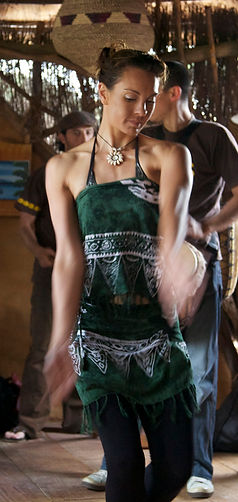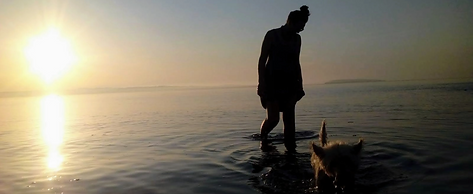Somatic Movement Practitioner.
Integrative Yoga Facilitator.
Intercultural Competence Trainer.
Interdisciplinary Researcher.
+44 74933 97563

Insider Practitioner
Intercultural Embodiment: Learning Through Relationship — Self, Other, and the Space Between.
My relationship with movement as a mode of communication and somatic connection began in childhood, shaped by early rhythmic dialogues with my father, a drummer. In those moments, we engaged in spontaneous, wordless exchange—him on the drums, me responding through the percussive language of feet on wood. This playful, embodied call-and-response became a formative experience in understanding movement as both relational and expressive. Years later, this connection deepened as I studied and performed African dance and djembe drumming, reaffirming rhythm as a shared, living language of the body.


Live performance in Te Whanganui-a-Tara (Wellington), Aotearoa — drawing on African dance lineages.
As an adolescent navigating the emotional complexity of family challenges—as many do—movement and breath became essential tools of regulation and release. I came to recognise emotion not as something to suppress but as an energetic current that could be embodied, expressed, and ultimately resolved through dance. These practices offered me a language for unspoken inner states, facilitating a connection between the seen and unseen, the felt and unarticulated.
While at university, I encountered Hatha Yoga in a quiet, dated upstairs room above a local shop. The integration of asana, pranayama, meditation, and deep rest brought an immediate sense of groundedness and inner coherence. This was not merely physical exercise; it was a return to self. Over time, I explored other forms, including Vinyasa, whose meditative flow provided a necessary counterbalance to the performative structures of formal dance.
This evolving practice deepened during my years in Aotearoa New Zealand, where I was invited to establish a Dance Department at Tauhara College. Later, learning Māori and Pasifika Performing Arts, and engaging with te reo Māori and tikanga Māori, I came to understand culture, movement, and language as deeply interwoven. This understanding was further deepened through affiliations with Ngāti Tūwharetoa and Ngāti Toa iwi, and through the privilege of studying with esteemed elders and scholars, including Dr Ngapo Wehi QSM (Ngāi Tūhoe, Te Whakatōhea, Ngāpuhi, Te Whānau-a-Apanui, Ngāti Kahu), Professor Kabini Sanga, and Dr Ocean Mercer (Ngāti Porou).
Growing out of this, I developed a practice grounded in relational respect, reciprocity, and embodied cultural understanding—from my perspective as a Pākehā (a person of European descent). A visit to Tonga, where I was welcomed as a guest in a village before presenting at an education conference, and time spent visiting other Pacific Islands, further
deepened my appreciation of diverse

PPTA News feature highlighting my TeachNZ Study Award, early research into the intersection of intercultural dialogue and dance, and the founding of Afro Fusion Contemporary Dance Collective—a cross-generational, community-based initiative rooted in inclusive performance practices, with works presented in Te Whanganui-a-Tara (Wellington) and Ōtautahi (Christchurch).
knowledge systems, particularly alternative embodiments of time and the importance of listening with the body as a way of cultivating understanding.
In Aotearoa, I was also drawn to Buddhist Dharma and meditation—exploring teachings that further shaped my approach to embodiment, presence, and awareness. These experiences, together with the insights I gained through working alongside young people and peers in culturally diverse settings, deepened my understanding of community as a dynamic, interconnected organism.
Gradually, I came to appreciate how we each carry our lived histories, embody personal paradigms, and communicate—both consciously and unconsciously—through deeply somatic processes. I also began to recognise, slowly, the vital role of openness without judgement—and with compassion and embodied reflexivity—in cultivating authentic relationality, or what I now understand as ‘strong relationality’.
Over the past thirty years, I have maintained a dedicated personal practice in yoga and dance, and have been teaching for more than twenty-five. My teaching is grounded in the Sivananda tradition of Hatha Yoga and has gradually evolved into what I call ‘Ki-An Yoga’—an integrative, trauma-sensitive approach that weaves together elements of Sivananda, Yoga in Daily Life, the Iyengar method, and Kundalini traditions, alongside somatic practices, Creative Dance methodologies, and both contemporary and African dance techniques.
The name ‘Ki-An’ reflects both the vitality of life energy (Ki) and the inner sanctuary (An) cultivated through consistent embodied practice. This approach supports central nervous system regulation, embodied congruence, and the capacity for ongoing personal development.
My formal dance training provides a strong foundation in anatomy and alignment. I place high value on skeletal integrity and breath awareness—not only for safe practice, but also as gateways to cultivating acceptance, compassion, and resilience. My commitment to creative somatic inquiry reflects a belief that movement is not merely expressive, but transformational—capable of supporting profound shifts in perception, behaviour, and relational engagement.

Guiding somatic yoga practice — cultivating alignment, breath, and embodied presence.
Working with young adults and individuals navigating substance use disorder, anxiety, stroke rehabilitation, and Parkinson’s disease has further deepened this belief. Through a trauma-sensitive lens, I have witnessed the body’s remarkable capacity to process, release, and restore. Yoga and somatic practice offer an accessible and compassionate pathway to embodied awareness —a reconnection beyond words and judgement, and a grounding from which resilience and empowerment can emerge.
My work is informed by current neuroscience, communication, and somatic research, which continues to affirm the body’s role in self-regulation, meaning-making, and relational healing.
As a lifelong learner, I remain passionately engaged in both professional and personal development. My current explorations include the expressive movement practice 5Rhythms, created by Gabrielle Roth, alongside formal study in Person-centred counselling. These evolving engagements continue to deepen and inform my trauma-responsive, relational pedagogy.

PhD graduation — Liverpool Hope University, 2023.
My teaching is rooted in what I practise. Pranayama, movement, and meditation are part of my daily life—sometimes through formal practice, sometimes woven into everyday rhythms. I hold a deep belief that tutor and learner are always both teacher and student: an evolving praxis which I have come to understand as a ‘Whānau-centred praxis’.
Teaching, learning, and research continue to excite and nourish me. The people I work with—students, colleagues, and clients—are among my greatest teachers. They inspire my ongoing exploration into the body as a vehicle for connection and transformation.
Drawing from lived experience and interdisciplinary research, I seek to offer a place to begin—to move beyond internal tensions, relational disharmony, and, as is so present in today’s cultural landscape, inequities. I believe that practices grounded in sensory awareness can foster meaningful, embodied, and enduring change.

Walking with Oscar at sunset — a moment of reflection and connection that grounds my somatic and relational practice.